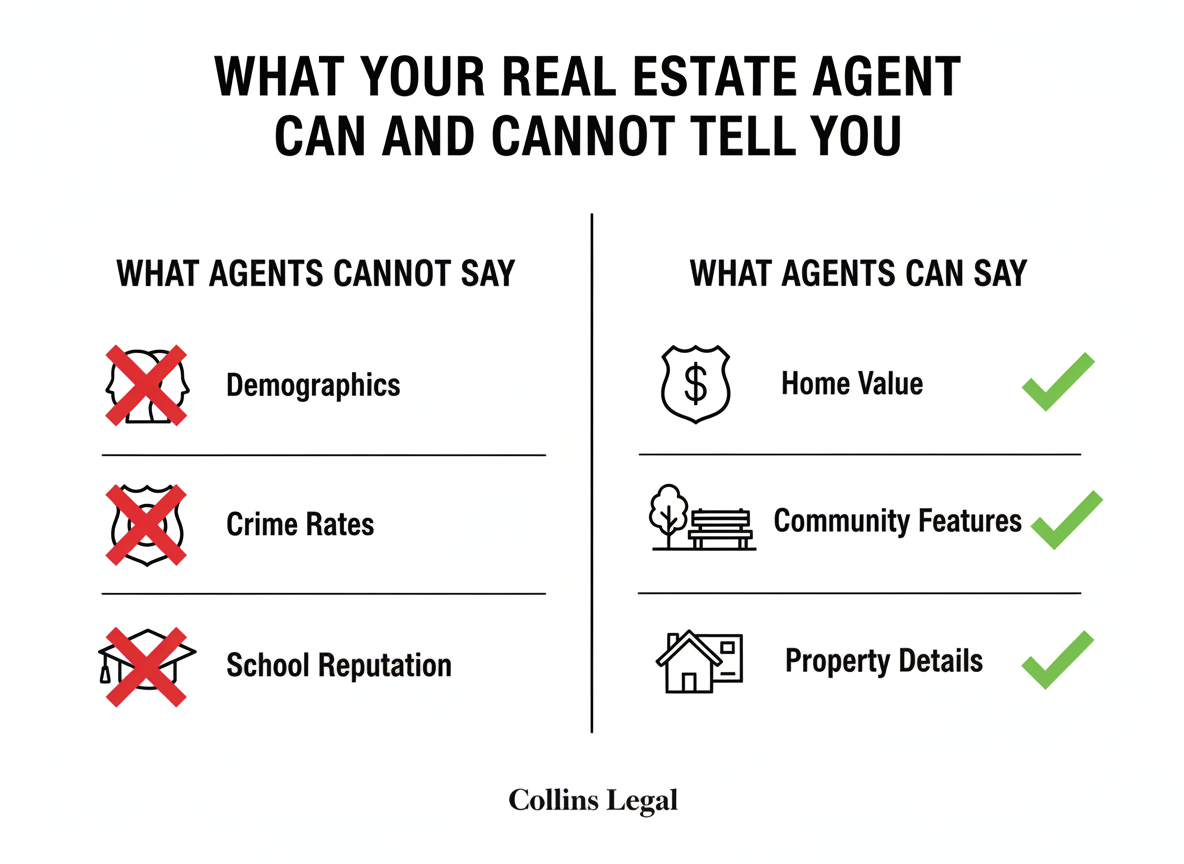The Fair Housing Act shapes what real estate agents can disclose. Here’s what you need to know before you buy or sell.
The Fair Housing Act changed the way real estate agents communicate with clients. If you’re buying or selling a home, you need to know what your agent can and can’t say—because the law isn’t just a formality. It shapes every conversation you have about neighborhoods, schools, and community life.
The Law: Why Agents Stay Silent on Certain Topics
The Fair Housing Act, passed in 1968, was designed to eliminate housing discrimination based on race, religion, sex, disability, and other protected classes. These rules don’t just apply to landlords—they bind real estate agents, too. When you ask about crime, schools, or who lives in a neighborhood, your agent isn’t being evasive. They’re following federal law.
What Agents Cannot Tell You
- Neighborhood Crime Rates: Agents can’t share personal opinions or statistics about crime or safety. Questions like “Is this a safe area?” will get you a referral to official crime databases, not an answer. Instead of providing you with direct information on a community’s crime rates, a real estate agent should refer you to the proper resources to find out these statistics for yourself.
- School District Reputation: Agents can’t discuss whether schools are “good” or “bad.” These opinions are often code for protected demographic information. Remember that you can always find information on school districts and their quality ratings online with a little research.
- Demographic Makeup: The demographic makeup of a community is another piece of information your real estate agent cannot legally share with you due to protections put in place by the Fair Housing Act. However, taking a look at the U.S. Census and other data provided by your local government can be a good way to find out this kind of information.
What Agents Can Tell You
- Home Values and Market Trends: Agents are experts at analyzing recent sales, pricing trends, and market value. They can tell you if a home is priced right and what similar homes have sold for. Based on recent sale prices of nearby homes and current market information, your real estate agent absolutely can (and should) provide you with an opinion on a home’s listing price.
- Community Features: Agents can describe parks, amenities, shopping, public transit, and upcoming construction. Anything about the physical environment is fair game.
- Property Details: They can talk about zoning, condition, legal restrictions, and the nuts and bolts of a property.
Why These Rules Matter
The restrictions exist to protect buyers and sellers from discrimination. They create a level playing field, ensuring everyone has the same access to housing information—no matter who they are. Your agent’s silence on certain topics is a sign of professionalism, not avoidance.
The Bottom Line
A great real estate agent helps you navigate the process, provides the facts, and keeps you compliant with the law. If you need more information, just ask for resources—Collins Legal is here to make sure you’re empowered, informed, and protected every step of the way.
This post was written in collaboration with Jake Gomes of the Gomes Agency.
Keep reading
→ BLOG: Easements in Tennessee: What You need to Know
→ BLOG: Easement in Gross
→ BLOG: Dangers of Dead Trees on Property
→ Connect: Connect with a Real Estate Attorney

